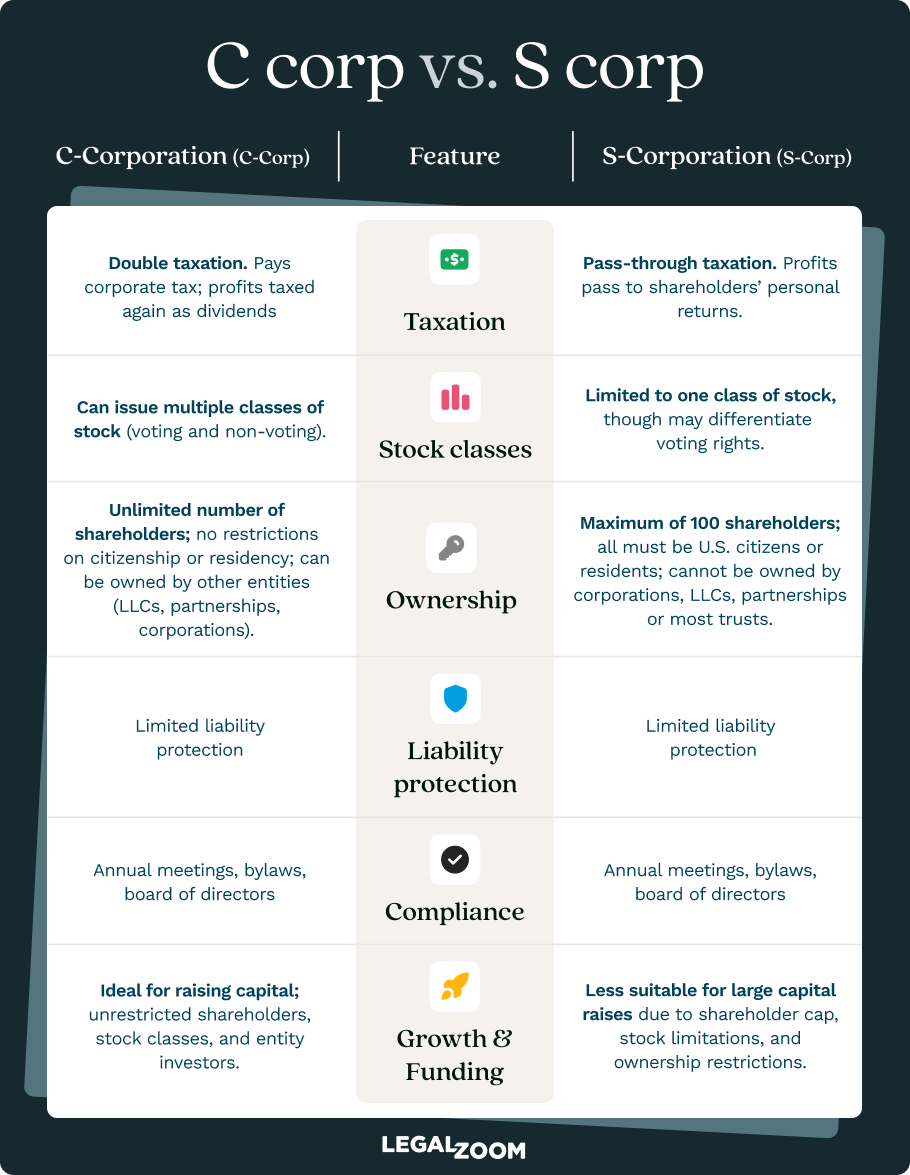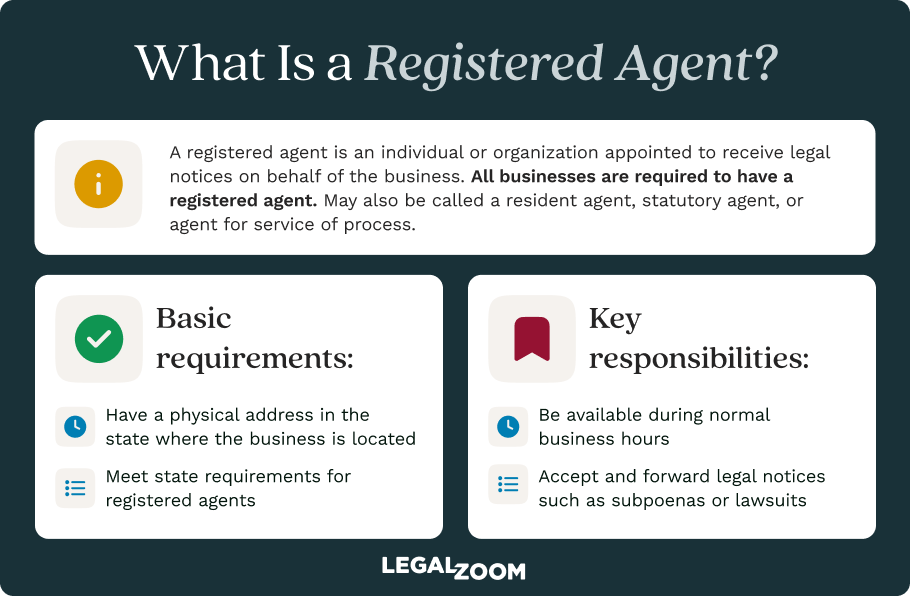Illinois is a powerhouse of innovation, with its shifting business infrastructure putting it on track to being one of the best states in the country for running a company. In fact, it ranks 13 on CNBC’s list of top states for business in America.
If you’re an entrepreneur looking to start a new venture, you may be considering structuring your new business as a corporation. This guide will help you understand if a corporation is right for you, and lay out how to form a corporation in Illinois step-by-step, including naming your business, filing articles of incorporation, managing ongoing compliance, and more.
What is an Illinois corporation?
An Illinois corporation is a legal business entity formed under the Illinois Business Corporation Act of 1983 (805 ILCS 5/). When you form a corporation in Illinois, you create a separate legal entity that exists independently from its owners (called shareholders), which can provide significant benefits, including personal asset protection from business debts and obligations.
Illinois corporations can conduct any lawful business activity and enjoy perpetual existence unless dissolved according to state law.
Corporation vs. LLC in Illinois: Which is right for your business?
| Factor | Illinois corporation | Illinois LLC |
|---|---|---|
| Liability protection | Limited liability for shareholders | Limited liability for members |
| Tax treatment | Double taxation (C corp) or pass-through (S corp) | Pass-through taxation |
| Ownership structure | Shareholders, directors, officers | Members and managers |
| Formalities | Board meetings, shareholder meetings, extensive recordkeeping | Minimal formalities, operating agreement |
| Investment flexibility | Multiple stock classes, easy investor entry | More complex for outside investors |
| Self-employment tax | Officers pay employment taxes | Members may pay self-employment tax |
When to choose an LLC
An Illinois LLC might be better if you:
- Prefer operational flexibility with minimal formalities
- Want simpler tax reporting with pass-through taxation
- Have a small number of owners who are actively involved
- Don't need to attract outside investors in the near term
- Want to avoid double taxation without S corp restrictions
- Prefer member-managed rather than board-managed structure
When to choose a corporation
Consider incorporating in Illinois if you:
- Plan to seek outside investment or go public eventually
- Want to offer employee stock options or other equity incentives
- Prefer structured management with clear roles and responsibilities
- Need multiple classes of ownership with different rights
- Want to elect S corporation status for tax benefits
- Operate in an industry where corporate structure enhances credibility
Key benefits of forming an Illinois corporation
When you form a corporation, your personal assets gain protection from your business' debts and obligations. This limitation of liability can also help protect you personally if someone sues the corporation or one of its employees. Here are some of the main reasons people form corporations:
- Limited liability protection for shareholders, directors, and officers
- Fringe benefits, such as health insurance programs and retirement plans
- Beneficial tax structures, including potential S corporation election
- Enhanced credibility with customers, vendors, and lenders
- Easier access to capital through stock issuance
- Perpetual existence that continues beyond the original founders
How to form an Illinois corporation: Step-by-step guide
Follow these essential steps to incorporate your business in Illinois.
Step 1: Choose a corporate name and conduct a business name search
Before forming your corporation, you'll want to make sure your name is available. The Illinois Secretary of State maintains a comprehensive database of all registered business entities in the state, which you can access for free online. You can search through this database to see if your desired business name is already taken. It’s also wise to look for similar business names or spelling variations.
Your corporation's name must also meet a few specific Illinois requirements:
- Must contain "corporation," "incorporated," "company," or "limited," or an abbreviation for one of those words (Corp., Inc., Co., or Ltd.)
- Must be distinguishable from the corporate or assumed name of any other corporation or limited liability company on file with the Illinois Secretary of State
- Cannot be the same as any name that is currently reserved
Step 2: Reserve your corporate name (optional)
If you’re not yet ready to file your formation paperwork, you can reserve your chosen name for 90 days. Complete Form BCA 4.10 (Application for Reservation of Name) and submit it to the Illinois Secretary of State at the address provided on the form. Include the $25 payment for the name reservation fee.
The reservation gives you time to prepare your incorporation documents without risk of another entity claiming your preferred name.
Step 3: Appoint a registered agent
All Illinois corporations must designate a registered agent to receive lawsuits, legal documents, and other important government mail. Your registered agent must either be an individual who resides in Illinois or a business authorized to transact business in Illinois and authorized by its statement of purpose to act as an agent.
Illinois registered agents must have a registered office in Illinois—a physical location where they can receive correspondence during normal business hours. A P.O. box is not sufficient for this purpose.
While you can serve as your own registered agent or assign that duty to an employee of your company, many businesses use professional registered agent services. These services exist to ensure reliable document handling, maintain privacy, and keep potentially sensitive legal correspondence separate from your place of business.
LegalZoom’s Chicago registered office meets all state requirements and also offers document scanning, unlimited cloud storage, and a compliance calendar to help you stay on top of filing deadlines.
Step 4: Prepare and file articles of incorporation
Your corporation exists as soon as your articles of incorporation are filed with the Illinois Secretary of State. You can file online or submit a printed and signed Form BCA 2.10. The following is the required information in your articles of incorporation.
- Corporate name: The exact name of your corporation, including the required corporate designator
- Registered agent and office: Complete name and Illinois address of your registered agent and registered office
- Corporate purpose
- Stock structure: Your articles must specify the number and class of shares that are authorized
- Directors: Names and address of all directors
- Incorporator information: Names and addresses of all incorporators
Once you’ve completed your articles, you can submit the document along with the $150 filing fee to the Illinois Secretary of State. You may also need to include your initial franchise tax payment.
Step 5: Create corporate bylaws
Although bylaws are not filed with the state, Illinois law requires all corporations to adopt bylaws. Your bylaws must:
- Be adopted the shareholders or initial directors
- Not conflict with your corporation's articles of incorporation or Illinois law
- Include provisions for the following:
- Number and duties of officers and directors
- How officers and directors are chosen
- Procedures for directors' and shareholders' meetings
- Voting procedures and quorum requirements
- Stock transfer restrictions (if any)
Step 6: Hold an organizational meeting
After filing your articles of incorporation, hold your first board of directors meeting. At this time, you will:
- Adopt corporate bylaws
- Elect officers
- Authorize issuance of stock certificates
- Adopt corporate resolutions
- Open corporate bank accounts
- Address other initial business matters
Be sure to take effective meeting minutes and set a precedent for clear recordkeeping.
Step 7: Issue stock certificates
Document ownership in your corporation by issuing stock certificates to initial shareholders. Maintain detailed records of:
- Stock certificate numbers
- Shareholder names and addresses
- Number of shares issued
- Consideration received for shares
- Date of issuance
Step 8: Obtain an employer identification number (EIN)
Corporations are federally required to obtain an EIN, which is used to open corporate bank accounts, file tax returns, hire employees, apply for business licenses, and more.
You can apply for an EIN on the Internal Revenue Service’s website or let LegalZoom’s EIN service handle it for you.
Step 9: Register for Illinois state taxes
If you have employees, you’ll have to register with the Illinois Department of Revenue for income tax withholding and unemployment insurance tax. If applicable to your business, you’ll need to register for sales tax as well. A tax specialist or CPA can help you determine if you’ll need to register for state or local sales taxes.
Step 10: Consider S corporation election (optional)
Within 75 days of incorporation, you may elect S corporation tax status by filing Form 2553 with the IRS. This election allows pass-through taxation while maintaining corporate liability protection.

What are the requirements for incorporating in Illinois?
Incorporator requirements
The incorporators prepare, sign, and file the articles of incorporation. Illinois law specifies a few important requirements for incorporators.
- Minimum number: At least one incorporator is required.
- Age requirement: Each incorporator must be at least 18 years old.
- Corporate incorporators: If the incorporator is another corporation, the articles must show the corporation's exact name and state of incorporation.
- Responsibilities: If directors are not named in the articles of incorporation, incorporators may meet to choose the initial directors.
After incorporation, incorporators have no further responsibilities, unless they also serve as directors or officers.
Director requirements
A corporate director is responsible for managing the corporation and setting corporate policies and strategies. Every corporation in Illinois must have at least one director, and every corporate director must act in the best interests of the corporation and its shareholders. Any other eligibility requirements can be created with your corporation’s bylaws.
Directors may delegate their management duties to committees or officers while retaining ultimate oversight responsibility.
Stock structure requirements
Illinois corporations must establish their stock structure in the articles of incorporation—both the number of shares authorized, and the number of shares issued.
You will need to detail the following information about authorized shares:
- Classes of shares. If there is more than one class of shares, articles must detail the differences between classes.
- Number and class. Articles must list the number and class of shares that are authorized.
- Preferred shares. If authorizing preferred or special shares without determining characteristics, articles must include language indicating that the board of directors will determine these matters in a resolution filed with the Secretary of State.
Once you’ve clearly laid out your share structure, it’s time to issue shares. You’ll need to keep clear records of this as well, including the following details:
- Initial issuance. Articles must list the number of issued shares, itemized by class and series.
- Consideration. Articles must state the total consideration paid for issued shares.
- Types of consideration. Acceptable consideration can include cash, property, or promissory notes (or a combination of the three).
A corporation can have different types of stock, called classes or series. These types of stocks can have different advantages. For example, one class can offer voting rights while another may not.
What are the costs and fees for Illinois corporations?
Initial formation costs
- Name reservation (optional): $25
- Articles of incorporation: $150
- Initial franchise tax payment: $0 for most businesses
- Certificate of good standing: $25
- Certified copies of articles of incorporation: Varies
Additional costs to consider
- Registered agent service: $100–$300 annually (if using a professional service)
- Corporate bylaws preparation: $200–$500 (if using an attorney)
- EIN application: Free if filed directly with IRS, $79 if filed with LegalZoom
- Corporate kit and seal: $50–$150 (depending on the service)
- Legal and accounting fees: Varies based on complexity
Ongoing annual costs
- Annual franchise tax: $0 for most businesses
- Annual report: $75, due by the last day of the month prior to the business’s anniversary month
- State income tax: Based on corporate income
- Federal income tax: Unless S corporation election is made
- Business permits and license fees: Varies
What is a certificate of good standing, and how do you get one in Illinois?
A certificate of good standing is an official document from the Illinois Secretary of State that confirms that your corporation is properly formed and authorized to do business in Illinois, all required filings and fees are current, and your corporation has not been dissolved or revoked.
When you need a certificate of good standing
Banks, lenders, and business partners commonly require this certificate for the following scenarios:
- Opening corporate bank accounts
- Applying for business loans or credit
- Entering into major contracts
- Qualifying to do business in other states
- Completing merger or acquisition transactions
How to obtain a certificate of good standing
- Visit the Illinois Secretary of State's Business Entity Search portal.
- Search for your corporation.
- Select "certificate of good standing" from available documents.
- Pay the $25 fee online.
- You can print the certificate from the receipt page or from the link on the returned email.
What are the ongoing compliance requirements for Illinois corporations?
Annual report filing
- Due date: Last day of the month prior to the business’s anniversary month
- Filing fee: $75
- Late penalty: 10% of the amount of annual franchise tax due
- Filing methods: Online through the Illinois Secretary of State's website or mail Form 14.05
Corporate records maintenance
Illinois corporations must maintain the following:
- Articles of incorporation and all amendments
- Bylaws and amendments
- Board of directors meeting minutes and resolutions
- Shareholder meeting minutes and resolutions
- Stock certificates and transfer records
- Financial records and tax returns
Registered agent maintenance
- Continuous requirement: Must maintain a registered agent at all times
- Address changes: File a Statement of Change of Registered Agent and/or Registered Office (Form BCA 5.10/5.20) within 30 days of any address changes
- Agent resignation: If your registered agent resigns, appoint a replacement immediately by filing Form BCA 5.10/5.20
State tax filing obligations
- Illinois corporate income tax: File Form IL-1120 annually.
- Franchise tax: An accountant or CPA can help you understand your obligation.
- Employment taxes: If you have employees, file quarterly withholding returns.
Federal tax requirements
- Corporate income tax: File Form 1120 (for C corporations) or Form 1120-S (for S corporations)
- Employment taxes: File quarterly Form 941 if you have employees
- Annual information: File various informational returns as required by the IRS
Form your Illinois corporation with LegalZoom
Ready to start a corporation in Illinois? LegalZoom’s business formation services can help you form a corporation online, provide a registered agent in Illinois, and ensure compliance with all state requirements.
FAQs about Illinois corporations
How long does it take to form a corporation in Illinois?
The Illinois Secretary of State typically processes articles of incorporation within 10 business days for standard filings. Expedited processing is available for an additional fee.
Can I be my own registered agent in Illinois?
Yes, you can serve as your own registered agent, but there are eligibility requirements. You must reside in Illinois and have a physical Illinois street address, be available during normal business hours to receive official documents and mail, and maintain a stable address for official correspondence. However, many businesses prefer professional registered agent services.

What are the annual requirements for Illinois corporations?
Illinois corporations must:
- File an annual report by the last day of the month prior to the business’s anniversary month ($75 fee)
- Pay the state franchise tax
- Maintain a registered agent and registered office in Illinois
- Keep corporate records current and accessible
- File state and federal tax returns as required
What is the difference between S corp and C corp in Illinois?
S corp is a tax election, while a C corp is a legal business entity. Certain businesses can choose to elect to be taxed as S corporations. Other differences include:
- Taxation. C corporations face taxation on corporate profits and again on personal income taxes; S corporations enjoy pass-through taxation.
- Ownership limits. S corporations are limited to 100 shareholders; C corporations have no limit.
- Stock classes: An S corp can have only one class of stock; A C corp can have multiple classes.
- Shareholder restrictions: S corp shareholders must be U.S. residents.
How do I dissolve an Illinois corporation?
To dissolve your Illinois corporation:
- Hold a meeting during which the directors approve dissolution.
- Obtain required shareholder consent.
- File articles of dissolution (Form BCA 12.20) with the Illinois Secretary of State.
- Pay final taxes and file final tax returns.
- Distribute assets to shareholders after paying debts.
- Cancel registrations and licenses.
LegalZoom’s Dissolution services offer everything from simple document creation to end-to-end dissolution management, depending on your needs.
Can a trust own an Illinois corporation?
Yes, a trust can own shares in an Illinois corporation. However, if the corporation elects S corp status, the trust must qualify as an eligible S corporation shareholder under IRS rules, such as:
- Grantor trusts
- Qualified subchapter S trusts (QSSTs)
- Electing small business trusts (ESBTs)
Jane Haskins, Esq. contributed to this article.



